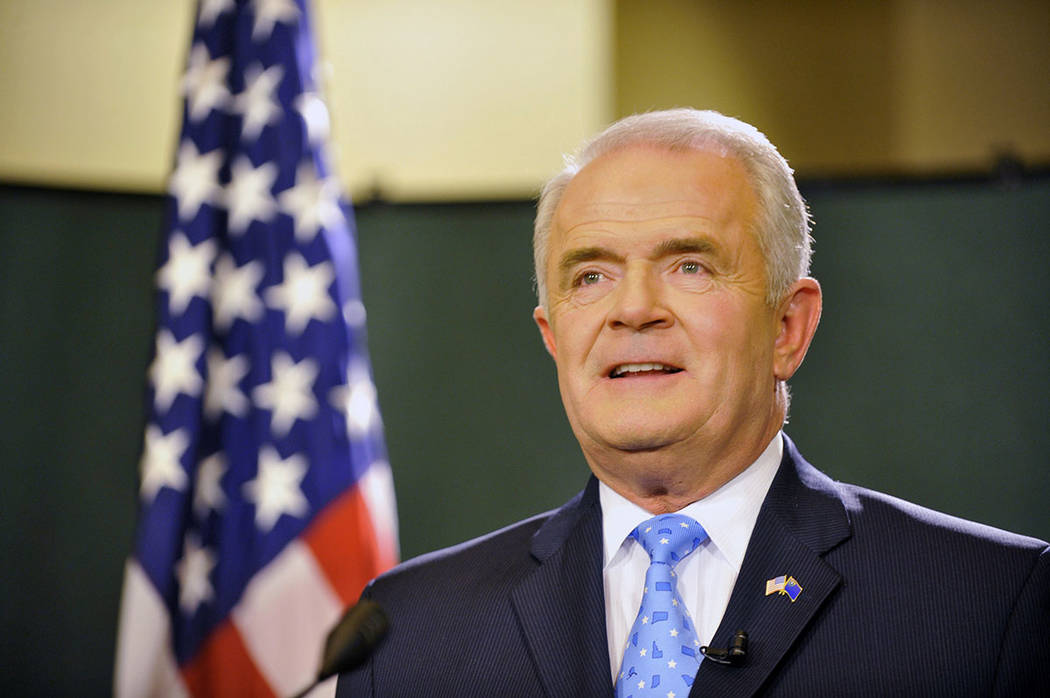STEVE SEBELIUS: Nevada’s LCB flops on the tax question
Back in 1994, then Assemblyman Jim Gibbons circulated a constitutional amendment that forced the Legislature to muster a vote of two-thirds of its members for any bill “which creates, generates or increases any public revenue in any form, including but not limited to taxes, fees, assessments and rates.”
The purpose of the amendment, of course, was to help get Gibbons elected governor. In that, it was unsuccessful.
But the effect of that initiative — approved overwhelmingly by voters in 1994 and 1996 — has played an outsize role in attempts to raise money in the Legislature ever since, including this year.
Assembly Bill 538 would stop the state’s payroll tax rate from dropping under a provision passed in 2015, raising a common moot-court debate question: Does preventing a scheduled tax decrease from going into effect constitute the creation, generation or increase of public revenue, and thus require a two-thirds vote?
Up until this year, it seemed the answer was yes, according to the Legislative Counsel Bureau, the nonpartisan attorneys who advise lawmakers.
Back in 2011, when a last-minute court ruling blew a hole in the state budget, lawmakers passed a bill that extended a package of supposedly temporary “sunset” taxes that had been set to expire. At the top of that session’s Assembly Bill 561, the words “Requires Two-Thirds Majority Vote” appear, in all caps, with a reference to the specific section of the bill that postponed the expirations.
Then in 2013, when the “sunsets” were extended once again, Senate Bill 475 bore the exact same label.
And in 2015, when the “sunsets” were finally made permanent, Senate Bill 483 made it clear once more that a two-thirds majority vote was required.
In 2017, the capital improvements budget hit a snag when it re-authorized a 17-cent property tax that would otherwise have expired. According to the LCB, a two-thirds vote was needed to keep the tax at the same level, even though nobody would have paid more as a result.
But this year, legislative leaders asked the counsel bureau to examine the issue in-depth. And in a 24-page memo, top lawyers Brenda Erdoes and Kevin Powers concluded that, in fact, forestalling a scheduled drop in a tax does not require a two-thirds vote.
“We believe that the two-thirds majority requirement applies toa bill which directly brings into existence, produces or enlarges public revenue in the first instance by imposing new or increased state taxes, ” the lawyers wrote. “However, when a bill does not impose new or increased state taxes but simply maintains the existing ‘computation bases’ currently in effect for existing state taxes, we do not believe that the two-thirds majority requirement applies to the bill.” (emphasis in original)
And again: “Consequently, we believe that Nevada’s two-thirds majority requirement does not apply to a bill which extends to a later date — or revises or eliminates — a future decrease in or future expiration of existing taxes when that future decrease or expiration is not legally operative and binding yet, because such a bill does not levy new or increased taxes … ”
On the one hand, the opinion makes sense: If taxes are not being created or increased, if people are paying the exact same rate today as they will tomorrow, and if public revenue does not go up, then on its face the two-thirds requirement should not apply.
On the other hand, this view is completely the opposite of the LCB’s longstanding stance on the issue, as evidenced by all those past bills that drafters said did require two-thirds.
To be fair to the counsel bureau, nobody ever asked for an in-depth examination of the issue up until now, so perhaps if they had, all those earlier “sunset” votes would havebeen much easier. But it’s also easy to see the cynic’s view, that the bureau rendered the opinion to allow legislative leaders to do what they wanted to do all along.
But will they?
Perhaps history offers some insight: Back in 2003, the Legislature was deadlocked over yet another tax package, lacking the two-thirds vote needed. As the new fiscal year dawned, then-Gov. Kenny Guinn sued, demanding lawmakers do their jobs and fund education.
The Nevada Supreme Court — in one of the most infamous, controversial and ill-reasoned decisions ever handed down — ruled that the Legislature could simply ignore the two-thirds requirement and raise taxes with a simple majority. Lawsuits were filed, voices raised, outrage flowed.
In the end, the Legislature wisely stayed in session until it found the two-thirds necessary to pass the tax package, choosing not to rely on a highly suspect opinion (one that was later correctly overturned). Better to build a budget on a solid foundation than to risk a future court ruling that sweeps away the pilings on which your budget is built.
Somewhere, Jim Gibbons — who eventually got elected governor in 2006 and served for one term — is probably smiling.
Contact Steve Sebelius at SSebelius@reviewjournal.com or 702-383-0253. Follow @SteveSebelius on Twitter.























